The 2nd International Lean Six Sigma Conference for Higher Education was held at HAN University of Applied Sciences on 2-3 June 2014 in Arnhem, The Netherlands (click here to see conference participants standing in front of the giant pink aardvark sculpture). The conference objectives were three-fold:
- How to get teaching staff and administration on-board
- Set a research agenda for Lean in higher education
- Strengthen the community of practitioners
It was a successful conference featuring a unique presentation-rebuttal-reflection format that generated a lot of valuable discussion. Here are some conference highlights from Day 1 (click to view the conference program and papers):
DAY 1: June 2 2014
- The opening speech was given by Dr. Frank Stöteler, Member of the HAN Executive Board. He provided an example of how Lean has helped improve higher education administrative processes such as scheduling courses, which students scored 2-3 prior to Lean and 8-10 after Lean. But, he also cited some problems, such as the slow pace of process improvement, incomplete improvements, or low commitment, and that success in one area does not easily translate to another area. Despite this, he is optimistic that Lean management is right for higher education for two reasons: 1) To improve the teaching process and 2) Lean as a subject taught to students to teach them how to think and improve business processes post-graduation. Finally, Dr. Stöteler noted that management must provide a safe environment for faculty to internalize and deploy Lean principles and practices in their teaching.
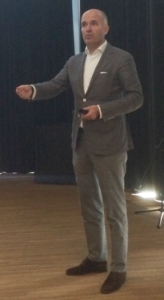 Dr. Vincent Wiegel gave a talk titled “Lean as a Management Strategy: Universal or Domain-Specific Adaptation Required.” He presented a contingency framework for the assessment and adoption of Lean in higher education. Thus far, Lean in higher education seems to “fall short of expectations and performance compared to other [application] domains.” Is this a structural problem, or a domain-specific [HE] problem? Dr. Wiegel raises questions such as: Is Lean universally applicable operations management strategy? If so, no adjustments need to be made for its use in higher education. If not, what adjustments must be made to improve its suitability for higher education? Dr. Wiegel suggests that some adjustments may be necessary. There was discussion over the nature and extent of the adjustments.
Dr. Vincent Wiegel gave a talk titled “Lean as a Management Strategy: Universal or Domain-Specific Adaptation Required.” He presented a contingency framework for the assessment and adoption of Lean in higher education. Thus far, Lean in higher education seems to “fall short of expectations and performance compared to other [application] domains.” Is this a structural problem, or a domain-specific [HE] problem? Dr. Wiegel raises questions such as: Is Lean universally applicable operations management strategy? If so, no adjustments need to be made for its use in higher education. If not, what adjustments must be made to improve its suitability for higher education? Dr. Wiegel suggests that some adjustments may be necessary. There was discussion over the nature and extent of the adjustments.
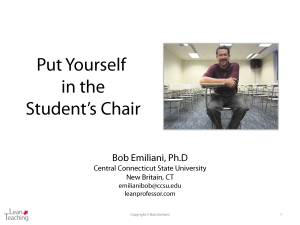 Yours truly was to give a talk on a conference paper titled: “One Is Good, More Is Better: Engaging Faculty In Lean Teaching.” But, rather than present a paper that anyone can easily read (whose basic theme is that one person can do a lot of good). I reviewed data from my recent surveys, and which support the case that teaching is not nearly as good as faculty and administrators think it is. And, a good way to improve professors’ teaching and students’ learning outcomes is to adopt the Lean teaching pedagogy. I suggested that this research could be taken up by others in attendance to validate or refute my findings using more sophisticated methods of survey data collection and analysis.
Yours truly was to give a talk on a conference paper titled: “One Is Good, More Is Better: Engaging Faculty In Lean Teaching.” But, rather than present a paper that anyone can easily read (whose basic theme is that one person can do a lot of good). I reviewed data from my recent surveys, and which support the case that teaching is not nearly as good as faculty and administrators think it is. And, a good way to improve professors’ teaching and students’ learning outcomes is to adopt the Lean teaching pedagogy. I suggested that this research could be taken up by others in attendance to validate or refute my findings using more sophisticated methods of survey data collection and analysis.
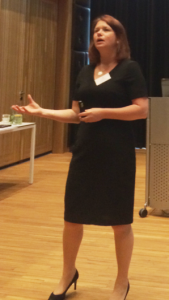 Dr. Zoe Radnor gave a talk titled: “It’s Lean, Jim, But Not As We Know It” (a play on a famous line from Star Trek). Dr. Radnor retold a wonderful story of service administration madness pertaining to sign-in books for people who rode bicycles to work in the U.K., where the practice of signing-in continued for decades after the original need for doing so had disappeared. Similar to Dr. Wiegel’s view, she suggested that the public service sector differs from private, for-profit manufacturing businesses, and that higher education will not succeed with Lean taken from manufacturing and applied to a service environment generally, and higher education in particular. This is driven in part by the fact that production and consumption occur simultaneously. Dr. Radnor also suggested it is important to talk in language of service management to help engage faculty and administrators.
Dr. Zoe Radnor gave a talk titled: “It’s Lean, Jim, But Not As We Know It” (a play on a famous line from Star Trek). Dr. Radnor retold a wonderful story of service administration madness pertaining to sign-in books for people who rode bicycles to work in the U.K., where the practice of signing-in continued for decades after the original need for doing so had disappeared. Similar to Dr. Wiegel’s view, she suggested that the public service sector differs from private, for-profit manufacturing businesses, and that higher education will not succeed with Lean taken from manufacturing and applied to a service environment generally, and higher education in particular. This is driven in part by the fact that production and consumption occur simultaneously. Dr. Radnor also suggested it is important to talk in language of service management to help engage faculty and administrators.
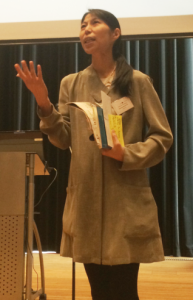 Dr. Shirley Mo-ching Yeung gave a talk titled “Linking WuWei (Daoism) with Contextualization via QFD for System Thinking.” The idea presented is to humanize supply chain management education by using a Lean method called “quality function deployment” (QFD) to take into account the technical information needs of students, as well as the interests of stakeholders as they pertain to social, economic, cultural, and environmental concerns. In essence, Dr. Yeung proposed a broader approach to curriculum development to include humanist values to better equip students to function in industry post-graduation. A critical feature is creating a curriculum that is designed to keep up with changing times, for both low- and higher-order skills.
Dr. Shirley Mo-ching Yeung gave a talk titled “Linking WuWei (Daoism) with Contextualization via QFD for System Thinking.” The idea presented is to humanize supply chain management education by using a Lean method called “quality function deployment” (QFD) to take into account the technical information needs of students, as well as the interests of stakeholders as they pertain to social, economic, cultural, and environmental concerns. In essence, Dr. Yeung proposed a broader approach to curriculum development to include humanist values to better equip students to function in industry post-graduation. A critical feature is creating a curriculum that is designed to keep up with changing times, for both low- and higher-order skills.
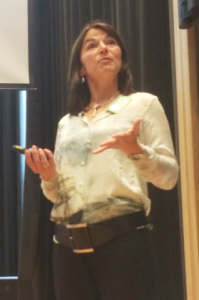 The last speaker of the day was Lejla Brouwer-Hadzialic, MBA. Ms. Brouwer-Hadzialic is a lecturer in Lean and presented her work: “Case Study HAN: Focusing on Students,” and spoke of the need for student learning as the driver for teaching. She shared her experience over the last four years teaching students and the various methods used to improve student engagement and learning outcomes in a multi-teacher model (up to seven teachers per course). For example, a cohort attends lectures 5 days a week for 5 weeks, then is assigned a project at a company for 4 days a week plus one day of lecture per week. They obtained weekly student feedback, while faculty met twice per week to review their performance. It is remarkable to see what happens when teachers re-think their pedagogy using the PCDA cycle.
The last speaker of the day was Lejla Brouwer-Hadzialic, MBA. Ms. Brouwer-Hadzialic is a lecturer in Lean and presented her work: “Case Study HAN: Focusing on Students,” and spoke of the need for student learning as the driver for teaching. She shared her experience over the last four years teaching students and the various methods used to improve student engagement and learning outcomes in a multi-teacher model (up to seven teachers per course). For example, a cohort attends lectures 5 days a week for 5 weeks, then is assigned a project at a company for 4 days a week plus one day of lecture per week. They obtained weekly student feedback, while faculty met twice per week to review their performance. It is remarkable to see what happens when teachers re-think their pedagogy using the PCDA cycle.
Ms. Brouwer-Hadzialic also served as the conference manager and is to be congratulated for making the conference a success in every way – from the beautiful Rozet Cultural Center to the dinners and everything in between. In summary, Day 1 of the conference was an engaging and stimulating affair.
